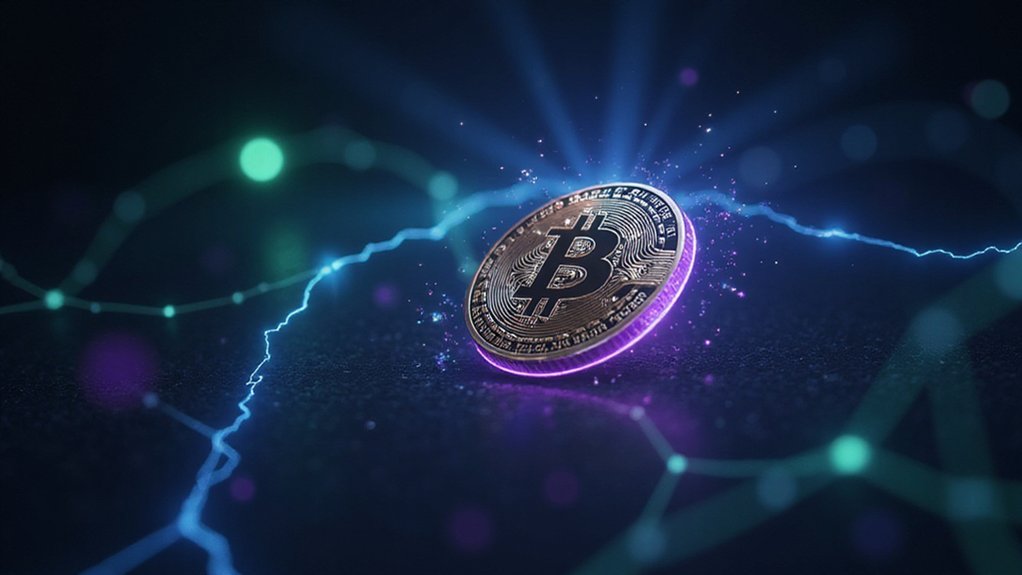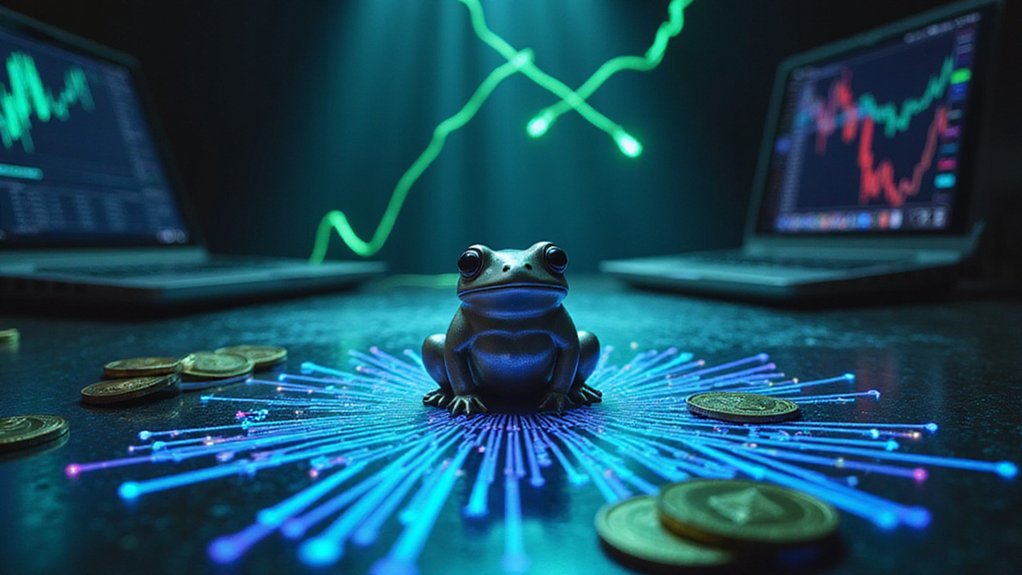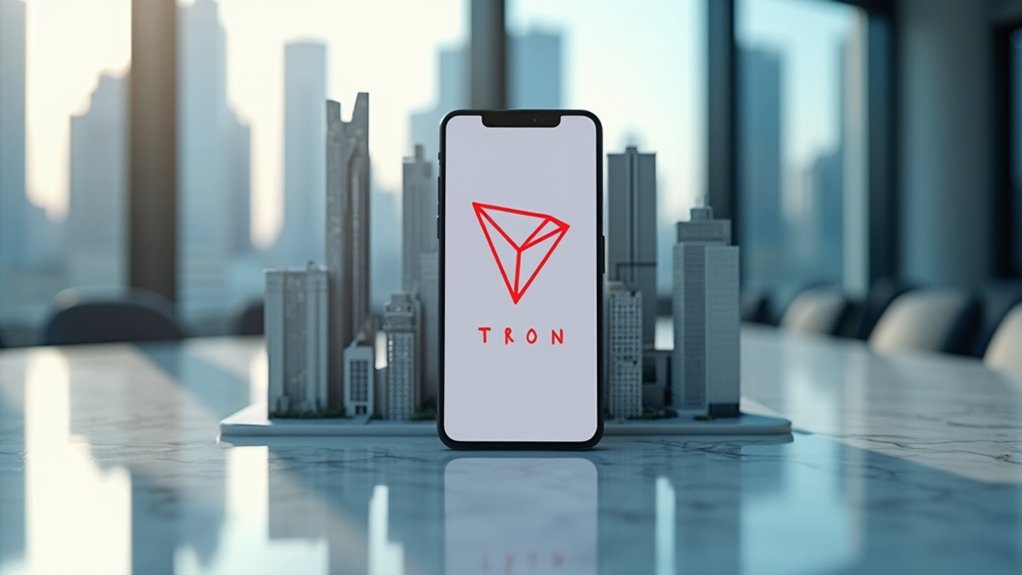Dakucoin exists primarily as a linguistic curiosity—bearing suspicious phonetic similarity to KuCoin, the legitimate Seychelles-based exchange processing $1.48 billion in daily volume—while maintaining virtually no verifiable presence across exchanges, development repositories, or regulatory frameworks that typically accompany functional digital assets. Extensive searches yield no substantive data on Dakucoin‘s technical specifications, trading venues, or development teams, contrasting sharply with established cryptocurrencies that demonstrate measurable market activity and transparent operational structures—distinctions that become increasingly significant upon closer examination.

The curious case of Dakucoin presents a fascinating study in cryptocurrency nomenclature confusion—or perhaps deliberate brand proximity.
Given that extensive searches yield virtually no substantive data about this particular digital asset, while its phonetically similar cousin KuCoin dominates the landscape as a major cryptocurrency exchange serving over 40 million users across 200+ countries.
This absence of verifiable information regarding Dakucoin becomes particularly intriguing when contrasted with KuCoin’s well-documented trajectory from its 2017 launch by blockchain enthusiasts Michael Gan and Eric Don to its current status among the top five global cryptocurrency exchanges.
The stark contrast between Dakucoin’s mysterious absence and KuCoin’s transparent billion-dollar exchange operations raises fundamental questions about digital asset legitimacy.
The Seychelles-incorporated platform processes approximately $1.48 billion in daily trading volume while offering access to over 900 digital assets—a stark contrast to Dakucoin’s apparent invisibility in the crypto ecosystem.
KuCoin’s evolution from its initial 2013 development phase through its public September 2017 launch demonstrates the typical maturation pattern of legitimate cryptocurrency ventures.
The platform’s founders, leveraging prior experience with Ant Financial and iBox PAY, constructed an extensive trading environment supporting spot, margin, futures, and options trading alongside automated bot functionality and P2P fiat integration.
Meanwhile, Dakucoin remains conspicuously absent from any meaningful market discourse or technical documentation.
The regulatory landscape further illuminates this disparity.
KuCoin faces tangible compliance challenges, particularly regarding US market access restrictions and recent regulatory scrutiny, while maintaining transparent reserve holdings exceeding $2.22 billion.
These real-world regulatory encounters—however problematic—at least confirm KuCoin’s operational existence, something entirely lacking for its phonetic doppelganger.
Market participants seeking Dakucoin exposure might reasonably question whether they’ve encountered a naming confusion, potential trademark issue, or perhaps stumbled upon an entirely speculative concept lacking fundamental substance.
The cryptocurrency space, notorious for projects ranging from revolutionary to ridiculous, has certainly witnessed stranger phenomena than phantom tokens bearing suspicious similarity to established platforms. Bitcoin’s market cap dominance at $2.06T demonstrates how legitimate cryptocurrencies establish measurable value and trading presence.
KuCoin maintains industry-leading encryption systems to protect user assets, while Dakucoin offers no verifiable security infrastructure whatsoever. Understanding how digital assets are influencing traditional financial markets requires analyzing actual cryptocurrencies with verifiable trading volumes and market presence.
Without concrete technical specifications, trading venues, development teams, or user communities, Dakucoin appears to exist primarily as a linguistic curiosity—a reminder that in cryptocurrency markets, due diligence extends beyond price charts to verifying basic asset existence.
Frequently Asked Questions
How Do I Store Dakucoin Safely in a Digital Wallet?
One stores Dakucoin through established digital wallet protocols—hardware wallets like Ledger or Trezor offer superior security versus software alternatives.
Cold storage provides ideal protection for long-term holdings, while hot wallets facilitate frequent transactions (though exchanges pose inherent risks).
Private key management remains paramount; losing access means permanent asset forfeiture.
Multi-signature configurations and two-factor authentication enhance security layers.
Regular software updates and reputable wallet selection minimize vulnerabilities—basic prudence that somehow eludes many crypto enthusiasts.
What Are the Transaction Fees When Sending or Receiving Dakucoin?
Dakucoin transaction fees remain mysteriously undocumented—a rather telling characteristic for any cryptocurrency claiming legitimacy.
Standard blockchain protocols dictate that network fees fluctuate based on congestion and transaction size, typically ranging from negligible amounts to several dollars during peak periods.
Without established exchange support or documented fee structures, users face the peculiar challenge of determining costs for a currency that may exist more in theory than practice.
Can I Mine Dakucoin and What Equipment Is Required?
Mining Dakucoin requires understanding its specific consensus mechanism and algorithm—details often as elusive as the cryptocurrency’s broader legitimacy.
Standard equipment includes ASIC miners for SHA-256 protocols, GPU rigs for alternative algorithms, or cloud mining services for those preferring remote operations.
Hardware selection depends entirely on Dakucoin’s technical specifications, mining difficulty, and profitability calculations.
Without verified protocol information, equipment recommendations remain theoretical exercises in cryptocurrency mining preparedness.
Which Cryptocurrency Exchanges Currently Support Dakucoin Trading?
Based on available exchange data, no major centralized platforms—including Binance, KuCoin, or Gate.io—currently list Dakucoin for trading.
Similarly, prominent DEXs like Uniswap and QuickSwap lack Dakucoin support, while P2P platforms such as LocalCoinSwap don’t feature it either.
This absence across traditional and decentralized venues suggests either limited market demand or insufficient liquidity to warrant listing—a common predicament for emerging cryptocurrencies seeking exchange adoption.
Is Dakucoin Legal to Use in My Country?
Determining Dakucoin’s legal status requires examining one’s specific jurisdiction, as cryptocurrency regulations vary dramatically worldwide.
Without thorough information about Dakucoin’s regulatory compliance or registration status, users face inherent uncertainty.
The coin’s legality depends entirely on local financial authorities‘ stance toward cryptocurrencies generally—some countries embrace digital assets while others impose outright bans.
Consulting local financial regulations and legal counsel remains prudent before engaging with any relatively obscure cryptocurrency.








